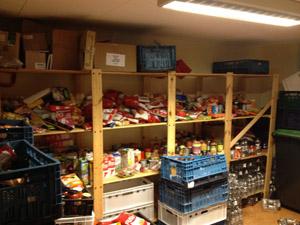Recession means new reality for Netherlands, stalwart economy of euro zone
Food banks in The Netherlands are seeing increased needs for service. (Photo by Clark Boyd.)
Take a walk through one of central Amsterdam’s biggest and swankiest department stores and it’s hard to find signs of a Dutch recession.
People stroll by carrying shopping bags with designer labels like Gucci and Rolex. But get out of the city center, and you will find people on the economic margins, struggling to get by.
The Netherlands has long been considered one of Europe’s strongest economies and a core part of the euro zone. But now the country is technically in recession. The country needs to make some painful budget cuts, but weeks of political wrangling over that led to the dissolution of the government earlier this week.
An organization that runs more than a dozen food banks in and around Amsterdam said the number of households it serves grew more than 30 percent in the first quarter of this year.
“We see that there is the crisis, and we see its effects,” said Piet van Diepen, who’s on the board of the food bank. “We’re afraid the number of our customers will grow in the coming months and years.”
Van Diepen said that most of the people using the food banks are hurting because of low income and high debts, and most live in public housing.
But that’s starting to change, he said.
“What we see now is a new group coming that maybe has bought a house, but is now without work, can’t afford to pay the mortgage, then they have problems,” van Diepen said. “We have seen some of them.”
But a reality check is in order here.
The Netherlands is not Greece, Spain or Italy. In fact, there’s only one eurozone country that’s richer per capita: Luxembourg.
Dutch unemployment and interest rates remain relatively low, and personal savings remain high. Yet the country still needs to slash more than $18 billion from its budget to meet European Union-mandated austerity targets.
Mathijs Bouman, a Dutch economist and commentator, said that the “a” word — austerity — has always been something the Dutch forced on others since the euro began in the early 1990s.
“It was always the Dutch who emphasized it, even more than the Germans. We forced austerity on the Greek people, on Portugal, Spain and Ireland, and now we are the ones failing,” he explained.
Bouman said Dutch politicians are trying to tap into the fear of that failure, in particular, Geert Wilders of the far-right “Freedom Party.” Wilders used the budget negotiations as a platform for attacking Brussels-mandated austerity targets. It wrecked the talks, according to Bouman, and brought down the government.
“It’s a political crisis we’re in, not a financial or economic one,” he added. “But, of course, political risks, if not well managed well can become a financial crisis if you lose the confidence of the markets.
And if Holland falters economically and politically, the fear is that the core of the euro zone may be about to falter.
And if the eurozone collapses, it would have global repercussions.
“This is serious business. The whole world is watching,” said Willem Post, an analyst and commentator with The Clingendael Institute in The Hague. “The Netherlands is a strong economy. We are in the top three in Europe, with Germany and Finland. We always had sound economic conditions here, and a good economy, but now we have some problems. If a country like the Netherlands — a rock solid economy — has its problems, that will have ramifications in Europe, but also consequences for the U.S. economy.”
In other words, what happens in The Netherlands, and more widely in the European economy, really matters.
“If things go wrong in Europe,” Bouman said, “then it will be the biggest financial crisis in history in the world. All the banks in the U.S. will have a huge problem. So, if you liked the credit crisis of 2008, you’ll love the euro crisis of 2012.”
The Dutch now have a caretaker government, which managed to reach a budget deal on Thursday. That will get sent on to Brussels for EU approval.
New elections are set for September, but many aren’t holding out much hope for stability.
It will be Holland’s seventh government in the past 12 years.
The story you just read is accessible and free to all because thousands of listeners and readers contribute to our nonprofit newsroom. We go deep to bring you the human-centered international reporting that you know you can trust. To do this work and to do it well, we rely on the support of our listeners. If you appreciated our coverage this year, if there was a story that made you pause or a song that moved you, would you consider making a gift to sustain our work through 2024 and beyond?
